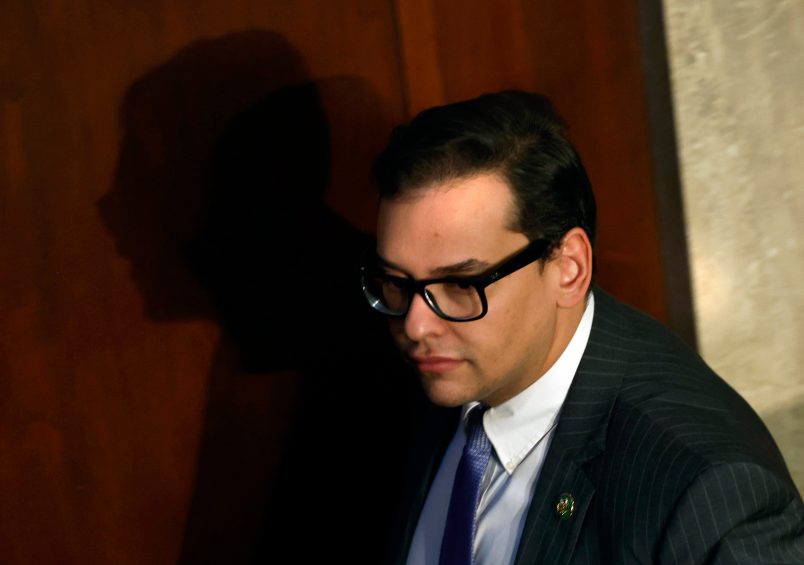The neverending speakership-election debacle that’s left Congress in an unprecedented legal limbo has also stranded George Santos, the member-elect who fabricated several aspects of his resume, in his own void. Santos — and the other freshmen members of Congress — have not been sworn in, and won’t be until the ongoing feud within the Republican Party reaches a truce and members finally elect a House speaker.
TPM spoke with experts to find out whether the floor fight might affect his future. The consensus was that neither the scandal nor pending investigations are likely to stop Santos from being seated.
The Constitution only has three qualifying criteria for seating a new member of the House: They must be at least 25-year-old, must have been a U.S. citizen for at least seven years, and must be a resident of the state in which they were elected. This ironclad rule was set in 1969 when the House tried to bar Adam Clayton Powell, the first Black lawmaker to represent New York, from his House seat due to allegations he had misappropriated committee funds. Powell and voters from his district sued and the case made it all the way up to the Supreme Court, which ruled that elected House members can’t be excluded if they meet the criteria.
“They tried to exclude him on ethics grounds,” Charles Tiefer, a law professor at the University of Baltimore and former deputy general counsel for the House, told TPM. “And the Supreme Court said, No, you can’t do that. As long as you meet the requirements of age and residency, you must seat him.”
That same principle applies to Santos, even though he has become the target of several prosecutors since his fraudulent backstory was highlighted by the New York Times. As of Thursday, Santos is being investigated by the Nassau County district attorney’s office, the U.S. attorney’s office for the Eastern District of New York, and the New York attorney general for falsifying his resume on the campaign, as well as Brazilian law enforcement for an embezzlement charge from 2008.
Stanley Brand, a former federal prosecutor and distinguished fellow in law and government at Penn State’s DIckinson School of Law, said Santos could still serve his congressional term even if he’s prosecuted.
“The House has usually taken the position, correctly, that they can’t discipline a member for conduct occurring before he was a member,” Brand said. “Even if he were charged, he would still be able to serve pending trial, conviction and sentencing.”
But Santos could still face other consequences. Congress is allowed to set its own rules, like refusing to place him on any committees. For example, the House voted 230-199 last year to strip Rep. Marjorie Taylor Greene (R-GA) of all of her committee assignments after she trafficked conspiracy theories and incited violence against Democrats before taking office.
Becoming a House member also won’t protect Santos from prosecution. The Constitution’s Speech or Debate Clause provides lawmakers with a certain level of immunity from criminal prosecution in matters regarding legislative acts. However, that doesn’t give Santos in particular that much cover.
“Even a broad definition of the term ‘legislative acts’ does not include alleged conduct occurring before a Member-elect is sworn in,” Robert Walker, former counsel for various House and Senate committees, told TPM via email.
Brand agreed.
“Those would be things that he would do as a member of the House or on committee or in voting, debating, et cetera,” Stanley Brand, a former federal prosecutor, said. “All the things that happened prior to his ascension to office would be open to investigation by federal and state authorities.”
Santos’ past includes a stint at a company that the SEC has described as a “ponzi scheme” and appears to be in the midst of an ongoing investigation. It is unclear whether the probes into the congressman stem from his campaign-trail fabrications or another offense.
And what about that lingering embezzlement charge out of Rio? Experts say that the U.S. would have to agree to extradite Santos to Brazil to be prosecuted, but that, too, is highly unlikely.
“I can’t honestly fathom our federal government agreeing to extradite the congressman,” Marybeth Beller, an associate professor of political science at Marshall University, said. “I’m not sure that there will be any gain for the United States to actually do that.”
Overall, short of a conviction, Santos will almost certainly stick around on Capitol Hill. In the past, House members who faced criminal charges opted to resign. Tiefer, however, pointed out that Santos technically wouldn’t even have to do that.
“As long as he doesn’t resign,” Tiefer said of Santos, “he can serve from a prison cell.” Such stubbornness, however, would be unprecedented.
Ultimately, Santos’s embellishments on the campaign trail introduce a thorny question for congressional politics that Brand describes as a “slippery slope”: How much lying is too much?
“Politicians say all kinds of things when they’re running for election,” he said. “What’s the line between a falsehood that’s typically recognized as part of a political give-and-take, and what’s a lie that goes to the heart of your ability to be elected? That’s never been litigated.”







A lying con man who has zero integrity and interest in governing. Only in it for the grift. Perfect example of today’s gop politician
While James Trafficant didn’t serve from a prison cell, that’s only because he was expelled from the House (420-1 vote). He certainly did run for congress again from his prison cell.
How about June? Who wants to bet the new House members wont be sworn in before summer?
Don’t all members of the House have to be sworn in? Even if you’re re-elected? Or is it once and done?
When a Speaker is elected, they will still need McCarthy and Santos votes. The majority is too close. This will not change.